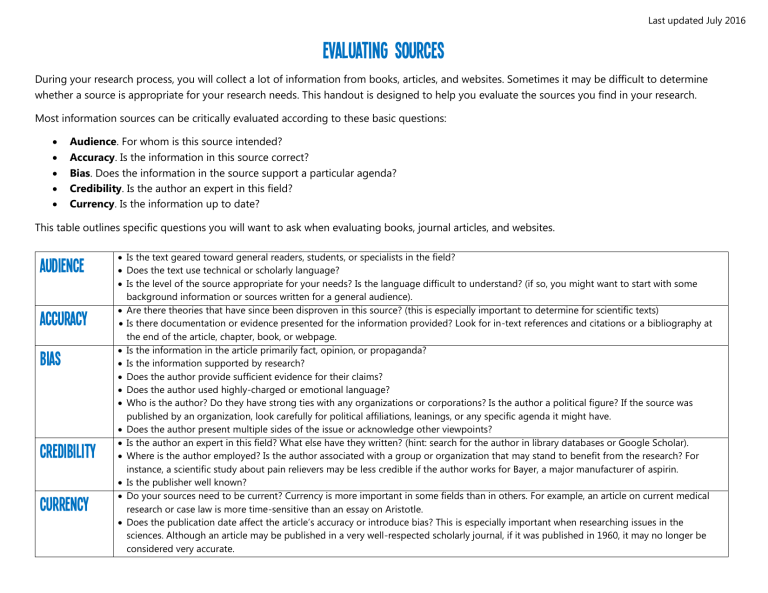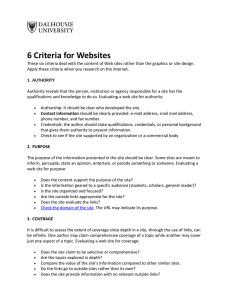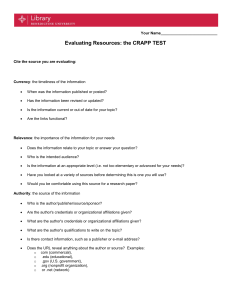
Last updated July 2016 Evaluating sources During your research process, you will collect a lot of information from books, articles, and websites. Sometimes it may be difficult to determine whether a source is appropriate for your research needs. This handout is designed to help you evaluate the sources you find in your research. Most information sources can be critically evaluated according to these basic questions: Audience. For whom is this source intended? Accuracy. Is the information in this source correct? Bias. Does the information in the source support a particular agenda? Credibility. Is the author an expert in this field? Currency. Is the information up to date? This table outlines specific questions you will want to ask when evaluating books, journal articles, and websites. Audience Accuracy Bias Credibility Currency Is the text geared toward general readers, students, or specialists in the field? Does the text use technical or scholarly language? Is the level of the source appropriate for your needs? Is the language difficult to understand? (if so, you might want to start with some background information or sources written for a general audience). Are there theories that have since been disproven in this source? (this is especially important to determine for scientific texts) Is there documentation or evidence presented for the information provided? Look for in-text references and citations or a bibliography at the end of the article, chapter, book, or webpage. Is the information in the article primarily fact, opinion, or propaganda? Is the information supported by research? Does the author provide sufficient evidence for their claims? Does the author used highly-charged or emotional language? Who is the author? Do they have strong ties with any organizations or corporations? Is the author a political figure? If the source was published by an organization, look carefully for political affiliations, leanings, or any specific agenda it might have. Does the author present multiple sides of the issue or acknowledge other viewpoints? Is the author an expert in this field? What else have they written? (hint: search for the author in library databases or Google Scholar). Where is the author employed? Is the author associated with a group or organization that may stand to benefit from the research? For instance, a scientific study about pain relievers may be less credible if the author works for Bayer, a major manufacturer of aspirin. Is the publisher well known? Do your sources need to be current? Currency is more important in some fields than in others. For example, an article on current medical research or case law is more time-sensitive than an essay on Aristotle. Does the publication date affect the article’s accuracy or introduce bias? This is especially important when researching issues in the sciences. Although an article may be published in a very well-respected scholarly journal, if it was published in 1960, it may no longer be considered very accurate. Last updated July 2016 Additional tips for evaluating specific source types Books Look at where the book was published. If it was published at a University Press, this could be an indicator of scholarly content. You can always search the web for more information about the publisher. Webpages Look for documentation of the information provided. Wikipedia articles often contain footnotes at the bottom of the article page, which can often lead to valuable print and electronic sources that may be more reliable than the entry itself. Check the domain type, as it might influence the nature of the information you are viewing. o Commercial sites usually end in .com. They might be trying to sell you something or promote their own product, so beware of selfpromotional language and potentially incomplete or biased information or statistics. What kind of support or information is used to support their claims? Consider cross-checking information with other independent organizations and reviews. o Academic sites end in .edu, but examine the URL and the page's content. Is it a library web page, or a student's personal project? o Canadian government-related sites end in gc.ca; Nova Scotia government sites end in gov.ns.ca, and U.S. government-related sites end in .gov. Keep in mind that reports, data and statistics, and official documents may be more reliable than general interest pages. Consider the relationship between the level of government and the topic. Documents that are more specific to the region and governance of a particular issue tend to be more valuable than broad international policies that could affect a local context. o Non-profit groups such as public interest organizations, religious groups, and think tanks use the .org domain. These sites may be biased toward the organization's point of view. Some organizations make clear their underlying philosophy, either in the very title of the organization or through an "About Us" section or a "Mission Statement." Others may require more research to discover their agenda. o Is there a tilde (~) in part of the URL? This implies that a web page is a personal page, even if it's linked to a larger institution. It may not be held to the same standards as the institution's pages, or reflect the institution's views. Is contact information for the author or publisher provided? Look for an “About the Author” or “About this site” link. What are the author’s credentials? Check a library database or Google Scholar to see if the author has published books or articles in scholarly journals. Be particularly wary of bias when viewing webpages. Anyone can create a webpage about any topic. Be sure to verify the validity of the information you find. This handout was adapted from the following sources: Indiana University Libraries. (n.d.). Evaluating sources rhetorically. Retrieved from https://libraries.indiana.edu/sites/default/files/Evaluating_Sources_Rhetorically.pdf UNC Chapel Hill Libraries. (n.d.). Evaluating your sources. Retrieved from http://www2.lib.unc.edu/instruct/evaluate/index.html?section=home University Library, University of Illinois. (n.d.). How do I…? Evaluate sources. Retrieved from http://www.library.illinois.edu/ugl/howdoi/How_Do_I_PDF_Files/Evaluate_Sources.pdf University of Calgary Writing Centre. (2014). Evaluating sources. Retrieved from https://www.ucalgary.ca/ssc/files/ssc/wss_evaluating_source_2014.pdf

